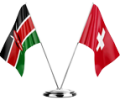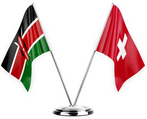TRADE AND INVESTMENT IN KENYA


Direction of Trade
African countries continue to be the major market for Kenya’s exports followed by the European Union. Exports of goods and services from Kenya in 2019 made up 12.03% of GDP while imports of goods and services in the same year were 21.37% of GDP. This clearly defines the challenge for Kenya to reduce the gap between the two to achieve a balance of payments.
Switzerland is among Kenya’s ten most important trading partners in Western Europe, while Kenya was Switzerland’s 12 th most important trading partner in sub-Saharan Africa in 2017. Kenyan exports to Switzerland include tea, coffee, horticultural products (fruits, vegetables and cut flowers), pyrethrum extract, precious and semi-precious stones. Swiss exports to Kenya consist primarily of medicines, paints, insecticides and herbicides, machinery, telephone equipment, fungicides and fertilizers.
The balance of trade between Kenya and Switzerland is in favor of Switzerland, with exports from Kenya in 2019 being KShs. 2,295,310.10 and imports from Switzerland in the same year standing at KShs. 8,023,930.20. The trade imbalance is reflected by a deficit to a tune of Kshs. -5,728,620,100.
Trade Incentives
Kenya has undertaken a comprehensive program of economic reforms designed to deregulate the economy and put it on the path of rapid employment generating growth.
Sustained efforts by the government to tighten fiscal and monetary policies since mid-1993 have been effective in stabilizing the economy and contributing to the revival of economic growth.
Stable macro-economic conditions, liberalized markets, and more operations of the strategic public enterprises are expected to enhance the level and the efficiency of private investment, and result in increased income and job creation.
The government encourages investment and the Kenyan economy remains open to foreign investors. There are no restrictions on foreign investment and repatriation of profits or capital.
Investment in the Export Processing Zones (EPZs) and Manufacturing Under- Bond (MUB) enjoys a 10 year tax holiday followed by 25% tax rate for the next 10 years and exemption from import duties, VAT, and Sales Tax. Foreign ownership in listed Kenyan companies is generally restricted to 40% in the aggregate and 5% for each individual investor.
There is a Manufacturing – Under Bond Scheme in operation. The
Export Processing Zones Authority (EPZA) operates in 39 Zones, (37 private, 2 public)
Market Access
Over and above the domestic demand, Kenya’s membership of several regional bodies provides an expanded market.
Membership of the East African Community (EAC) and the Common Market for Eastern and Southern Africa (COMESA) guarantees a market of approximately 300 million people and provides free movement of goods and services.
Trading under the Africa Continental Free trade Area (AfCFTA) which commenced on 1 st January 2021, has expanded this market to over 1.2 billion people. As of February 2021, 54 of the 55 African Union Member States had signed the AfCFTA treaty, while 36 countries had ratified it and deposited their instruments of ratification. Trade under the AfCFTA means a liberalized single market for goods and services facilitated by the easy movement of people and capital. It also lays the foundation for a continent-wide customs union. Ultimately, this new single market is expected to contribute to sustainable and inclusive socio-economic development, gender equality and, more broadly, enhanced competitiveness and industrial development.
- East African Community Webiste; www.eac.int
- Common Market for Eastern & Southern Africa Website; www.comesa.int
Overview
Investment opportunities exist in a variety of sectors, including agro based industries, machinery and building materials, furniture and paper products, garments and textiles, jewellery and watch manufacture, food processing, cosmetics, pharmaceuticals, electronic goods, solar technology products; IT/Data processing, tourism, banking and financial services, housing, roads, ports, railways and the energy sector.
Links
Information on the investment regime, opportunities and options can be found at the website below:
Invest in Kenya Website, www.invest.go.ke/
For ease of doing business in Kenya visit: www.industrialization.go.ke
Kenya has had considerable growth in the past few years. As of 2020,
Gross Domestic Product (GDP) stood at USD 98,843 billion with per capita income of USD 1,838 according to World Bank data. From 2015-2019, Kenya’s economic growth averaged 5.7%, making it one of the fastest growing economies in Sub-Saharan Africa. The performance of the economy has been boosted by a stable macroeconomic environment, positive investor confidence and a resilient services sector.
Kenya’s Economy is distinguished from most African countries by the fact that it is one of the most diversified and advanced.
Key sectors of the economy include agriculture, manufacturing, real estate and services. Although agriculture remains the mainstay of the economy at 30 per cent of GDP, manufacturing’s share of GDP has been rising significantly over the years. At 10 per cent, manufacturing is the second- largest contributor to GDP, with the processing of agricultural products a key factor in growth.
The Economy is Liberalized
Kenya operates a liberal economy which promotes trade and investment.
The country has, abolished price and exchange controls. The Government has also instituted measures to sustain macro-economic stability such as prudent fiscal and monetary policies, improvements in economic governance, and privatization of some public enterprises. These policies continue to promote growth by providing a more secure environment for private sector investment decisions.
Kenya guarantees capital repatriation and remittance of dividends and interest to foreign investors, who are free to convert and repatriate profits.
Private enterprises, both foreign and domestic, can freely establish, acquire, and dispose of business enterprises according to the Companies Act. The Constitution of Kenya provides protection against the expropriation of private property. Only permitted subject to the payment of prompt and fair compensation.
Doing business in Kenya
The Registrar of Companies is responsible for business registrations in Kenya. He/she issues certificates of compliance for foreign companies, certificates of incorporation for local companies and certificates of registration for sole proprietorship and partnerships.
Firms must then obtain registration with National Social Security Fund (NSSF), National Hospital Insurance Fund (NHIF) and the Kenya Revenue Authority (KRA) . A business permit should also be obtained from the County Government depending on the business type.
All company and business registrations (sole proprietorship and partnerships) are being done through the ecitizen online platform but for limited liability partnerships (LLPs) registrations which are still manual and are being done at the company registry.
Investment Opportunities
Investment opportunities exist in nearly all the sectors and especially in agro based industries, machinery and building materials, furniture and paper products, garments and textiles, jewellery and watch manufacture, food processing, cosmetics, pharmaceuticals, electronic goods, solar technology products; IT/Data processing, tourism, banking and financial services, housing, roads, ports, railways and energy sector.
For more information visit the Invest in Kenya Website; www.invest.go.ke
The Big Four Agenda
As part of the Vision 2030, Kenya’s development blueprint covering the period 2008 to 2030, the Kenyan Government is implementing its Third Term Medium Plan (MTP), between 2017 and 2022. The MTP is being driven through a targeted transformative agenda, known as the Big Four Agenda, based on four socio-economic pillars namely, Increasing Manufacturing; Food and Nutrition Security; Providing affordable Homes and; Universal Health Coverage. This is meant to address the pressing concerns facing Kenyans and create the best environment for achieving accelerated socio-economic transformation.
For further information, visit the The Big Four Agenda Website Visit Website; big4.delivery.go.ke
Direction of Trade
African countries continue to be the major market for Kenya’s exports followed by the European Union. Exports of goods and services from Kenya in 2019 made up 12.03% of GDP while imports of goods and services in the same year were 21.37% of GDP. This clearly defines the challenge for Kenya to reduce the gap between the two to achieve a balance of payments.
Switzerland is among Kenya’s ten most important trading partners in Western Europe, while Kenya was Switzerland’s 12 th most important trading partner in sub-Saharan Africa in 2017. Kenyan exports to Switzerland include tea, coffee, horticultural products (fruits, vegetables and cut flowers), pyrethrum extract, precious and semi-precious stones. Swiss exports to Kenya consist primarily of medicines, paints, insecticides and herbicides, machinery, telephone equipment, fungicides and fertilizers.
The balance of trade between Kenya and Switzerland is in favor of Switzerland, with exports from Kenya in 2019 being KShs. 2,295,310.10 and imports from Switzerland in the same year standing at KShs. 8,023,930.20. The trade imbalance is reflected by a deficit to a tune of Kshs. -5,728,620,100.
Trade Incentives
Kenya has undertaken a comprehensive program of economic reforms designed to deregulate the economy and put it on the path of rapid employment generating growth.
Sustained efforts by the government to tighten fiscal and monetary policies since mid-1993 have been effective in stabilizing the economy and contributing to the revival of economic growth.
Stable macro-economic conditions, liberalized markets, and more operations of the strategic public enterprises are expected to enhance the level and the efficiency of private investment, and result in increased income and job creation.
The government encourages investment and the Kenyan economy remains open to foreign investors. There are no restrictions on foreign investment and repatriation of profits or capital.
Investment in the Export Processing Zones (EPZs) and Manufacturing Under- Bond (MUB) enjoys a 10 year tax holiday followed by 25% tax rate for the next 10 years and exemption from import duties, VAT, and Sales Tax. Foreign ownership in listed Kenyan companies is generally restricted to 40% in the aggregate and 5% for each individual investor.
There is a Manufacturing – Under Bond Scheme in operation. The
Export Processing Zones Authority (EPZA) operates in 39 Zones, (37 private, 2 public)
Market Access
Over and above the domestic demand, Kenya’s membership of several regional bodies provides an expanded market.
Membership of the East African Community (EAC) and the Common Market for Eastern and Southern Africa (COMESA) guarantees a market of approximately 300 million people and provides free movement of goods and services.
Trading under the Africa Continental Free trade Area (AfCFTA) which commenced on 1 st January 2021, has expanded this market to over 1.2 billion people. As of February 2021, 54 of the 55 African Union Member States had signed the AfCFTA treaty, while 36 countries had ratified it and deposited their instruments of ratification. Trade under the AfCFTA means a liberalized single market for goods and services facilitated by the easy movement of people and capital. It also lays the foundation for a continent-wide customs union. Ultimately, this new single market is expected to contribute to sustainable and inclusive socio-economic development, gender equality and, more broadly, enhanced competitiveness and industrial development.
- East African Community Webiste; www.eac.int
- Common Market for Eastern & Southern Africa Website; www.comesa.int
Investment opportunities exist in a variety of sectors, including agro based industries, machinery and building materials, furniture and paper products, garments and textiles, jewellery and watch manufacture, food processing, cosmetics, pharmaceuticals, electronic goods, solar technology products; IT/Data processing, tourism, banking and financial services, housing, roads, ports, railways and the energy sector.
Links
Information on the investment regime, opportunities and options can be found at the website below:
Invest in Kenya Website, www.invest.go.ke/
For ease of doing business in Kenya visit: www.industrialization.go.ke
Kenya has had considerable growth in the past few years. As of 2020,
Gross Domestic Product (GDP) stood at USD 98,843 billion with per capita income of USD 1,838 according to World Bank data. From 2015-2019, Kenya’s economic growth averaged 5.7%, making it one of the fastest growing economies in Sub-Saharan Africa. The performance of the economy has been boosted by a stable macroeconomic environment, positive investor confidence and a resilient services sector.
Kenya’s Economy is distinguished from most African countries by the fact that it is one of the most diversified and advanced.
Key sectors of the economy include agriculture, manufacturing, real estate and services. Although agriculture remains the mainstay of the economy at 30 per cent of GDP, manufacturing’s share of GDP has been rising significantly over the years. At 10 per cent, manufacturing is the second- largest contributor to GDP, with the processing of agricultural products a key factor in growth.
The Economy is Liberalized
Kenya operates a liberal economy which promotes trade and investment.
The country has, abolished price and exchange controls. The Government has also instituted measures to sustain macro-economic stability such as prudent fiscal and monetary policies, improvements in economic governance, and privatization of some public enterprises. These policies continue to promote growth by providing a more secure environment for private sector investment decisions.
Kenya guarantees capital repatriation and remittance of dividends and interest to foreign investors, who are free to convert and repatriate profits.
Private enterprises, both foreign and domestic, can freely establish, acquire, and dispose of business enterprises according to the Companies Act. The Constitution of Kenya provides protection against the expropriation of private property. Only permitted subject to the payment of prompt and fair compensation.
Doing business in Kenya
The Registrar of Companies is responsible for business registrations in Kenya. He/she issues certificates of compliance for foreign companies, certificates of incorporation for local companies and certificates of registration for sole proprietorship and partnerships.
Firms must then obtain registration with National Social Security Fund (NSSF), National Hospital Insurance Fund (NHIF) and the Kenya Revenue Authority (KRA) . A business permit should also be obtained from the County Government depending on the business type.
All company and business registrations (sole proprietorship and partnerships) are being done through the ecitizen online platform but for limited liability partnerships (LLPs) registrations which are still manual and are being done at the company registry.
Investment Opportunities
Investment opportunities exist in nearly all the sectors and especially in agro based industries, machinery and building materials, furniture and paper products, garments and textiles, jewellery and watch manufacture, food processing, cosmetics, pharmaceuticals, electronic goods, solar technology products; IT/Data processing, tourism, banking and financial services, housing, roads, ports, railways and energy sector.
For more information visit the Invest in Kenya Website; www.invest.go.ke
The Big Four Agenda
As part of the Vision 2030, Kenya’s development blueprint covering the period 2008 to 2030, the Kenyan Government is implementing its Third Term Medium Plan (MTP), between 2017 and 2022. The MTP is being driven through a targeted transformative agenda, known as the Big Four Agenda, based on four socio-economic pillars namely, Increasing Manufacturing; Food and Nutrition Security; Providing affordable Homes and; Universal Health Coverage. This is meant to address the pressing concerns facing Kenyans and create the best environment for achieving accelerated socio-economic transformation.
For further information, visit the The Big Four Agenda Website Visit Website; big4.delivery.go.ke










